|
|
|
|
|
|
|
|
|
|
|
|
|
|
|
|
|
|
|
|
 |
| |
>
INTRODUCTION
a
fascination with imagination |
| |
>
THEME PARK MAGIC
inspirational rides and attractions |
| |
>
A PHANTOM PLOT UNFOLDS
a 2003 test from Disneyland ideas |
| |
>
THE HAUNTING BEGINS
five
years of Halloween, 2004-2008 |
|
>
BACK FROM THE GRAVE
2010-2011 with new technology |
| |
>
A 2013 RESURRECTION
a mix of new and age-old effects |
| |
>
DAWN OF THE UNDEAD
2014
show, part one |
| |
>
THE ZOMBIES EMERGE
2014 show, part two |
| |
>
A CHANGING CONCEPT
2015 show, part one |
| |
>
BUILDING PNEUMATIC FIGURES
2015 show, part two |
| |
>
ROLL UP, ROLL UP!
2015
show, part three |
| |
>
INTO THE TUNNEL...
2016
show, part one |
| |
>
MAKING MONSTERS MOVE
2016
show, part two |
| |
>
TO HELL AND BACK
2016 show, part three |
| |
>
SHARPENING THE
SENSES
2017 show, part one |
| |
>
A MAGNETIC ATTRACTION
2017 show, part two |
| |
>
THE BIG EXECUTION
2017 show, part three |
|
|
|
| |
Re-animated for 2010! |
|
|
|
|
|
|
|
|
|
|
|
|
|
|
|
|
|
|
|
|
|
|
| |
It was September
2010 when Sam jokingly suggested to me on the phone that I
should bring the Halloween Experience back. By this point,
we’d been involved in lots of stage events and other similar
things, and had built up a large collection of lighting
equipment in the process.
The idea of using some of this to create a new and advanced
display was easily enough to convince me that we should
resurrect it... |
|
|
|
|
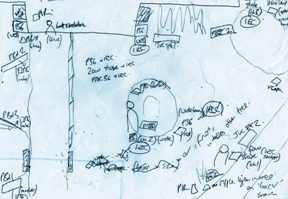 |
|
|
| |
|
|
|
|
|
|
|
|
|
|
|
|
|
|
|
|
|
| |
Improving effect
automation and control |
|
|
|
|
|
|
|
|
|
|
|
|
|
|
|
|
|
|
|
| |
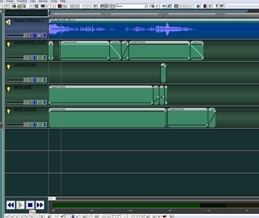 |
|
|
|
There was
something that I definitely wanted in the new 2010
experience – synchronised lighting and sound! That is to
say, when a person triggered a sensor, a sequence would run
whereby the relevant lighting and sound effects would be
controlled by the same device, to specific pre-set timings.
After some searching I came across a piece of software
called
VenueMagic. This is a
well-known program that has applications all around the
world, and was originally designed to control effects in
dark rides and Halloween attractions. |
|
|
|
|
|
|
|
|
|
|
|
|
|
|
|
|
|
|
|
|
| |
The compelling
feature was the ability to synchronise lighting effect
changes with a soundtrack, through the use of a timeline
(above) -
exactly what I was looking for. The software could connect
to a range of different DMX interfaces, to allow for DMX
signals to be sent to the required lighting devices.
The lighting itself was improved by using DMX-controlled LED
fixtures, such as PAR 56s. By using their arrangement of
red, green and blue LEDs, colour mixing and dimming could be
achieved. These were useful for providing colour washes for
scenes. Incandescent PAR 36s and PAR 16s, with their much
narrower beams, were used for focussing light on a
particular figure or prop. I have used these for this
purpose in all subsequent shows too. |
|
|
|
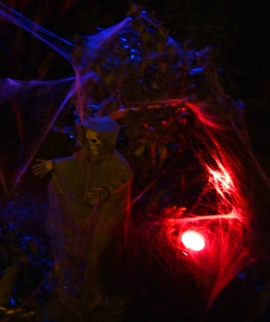 |
|
|
|
|
|
|
|
|
|
|
|
|
|
|
|
|
|
|
|
|
|
|
|
|
|
| |
But how to
actually trigger the VenueMagic timeline? The idea I had was
that if it could be activated via a mouse-click on the
computer, could I develop a circuit that performed this
mouse-click when powered on by the motion sensors that I'd
used before? |
|
|
|
|
|
|
|
|
|
|
|
|
|
|
|
|
|
|
|
|
|
|
|
|
|
 |
|
|
|
|
|
|
|
|
|
|
|
|
|
|
|
|
| |
|
|
|
After a bit of
thinking, I came up with a design. The photo to the left
shows the circuits (built on prototype board) that were used
to trigger the individual computers. |
|
|
| |
|
|
|
They operated as
555 monostables (normally low output, briefly high when
triggered, powering an optocoupler with mouse button
connected, before returning low - this action 'clicked' the
mouse). This photo was taken in 2013, but the circuits were
the same in 2010. Also visible, top left of the board, is
another timing circuit that triggered a smoke machine.
Not a particularly electrically innovative solution, but it
worked every time and I used this method for three years! |
|
|
|
|
|
|
|
|
|
|
|
|
|
|
|
|
|
|
|
| |
This introduction
of programmable DMX control opened up a huge range of
possibilities. Now, almost anything could be turned on or
off, on cue, via dimmers or relay circuits, and be
synchronised with a sound effect. With the new LED lighting, figures
and sets could change colour, strobe, or blackout at any
moment necessary, enabling the creation of magical effects.
Best of all, these programmed sequences could be triggered by PIR sensors - the activation of these effects would now be
totally automatic!
|
|
|
|
|
|
|
|
|
|
|
|
|
|
|
|
|
|
|
|
|
|
|
|
|
| |
Motion-triggered
magic and mayhem |
|
|
|
|
|
|
|
|
|
|
|
|
|
|
|
|
|
|
|
|
|
|
|
|
|
|
| |
 |
|
|
There were
several things inspired from Phantom Manor once
again; the same Boot Hill music from 2008 was used to
give a spooky mood; the Phantom laughter skeleton up in the
trees also returned, and the porch featured sounds from the
opening part of the ride's
soundtrack, as a motion-activated light and sound sequence.
< When visitors stepped near, the red lights suddenly went
out, and loud thunder and more evil laughter was heard,
accompanied by bright flashes of lightning.
> In a nod to the 'stretching room' scene of Phantom
Manor, I came up with
the idea of putting a big white sheet across one of the top
windows of the house, and then hanging a cut-out silhouette
of a skeleton behind it. A reflector lamp behind the
silhouette was flashed on and off via a dimmer, which
allowed the realistic shadow of a hanging corpse to
appear occasionally in the window!
< One of my other favourite features was a ghoul
positioned at
the back of the garden, in total darkness. With a scream, he
was suddenly lit up by a strobe, creating a great shock
effect as he appeared out of nowhere!
> I used a sound from the entrance of Rumpus Mansion
at Blackgang Chine to bring to life a figure of a skeleton
who stood in the centre of the garden. A 60W strobe was
mounted up in the trees, and when visitors walked up the
path, a loud clap of thunder and some bright lightning
flashes startled them! The skeleton then lit up, and urged
visitors to come further into the garden – “Come in, why
don’t you?! Just step this way…!” |
|
|
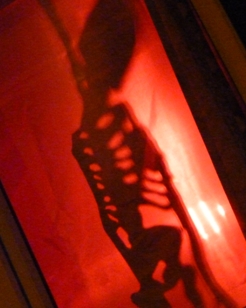 |
|
|
|
|
|
|
|
|
|
|
|
|
|
|
|
|
|
|
| |
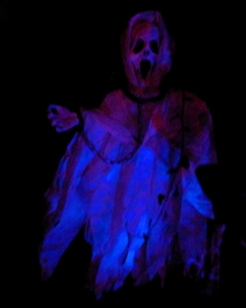 |
|
|
|
|
 |
|
|
|
|
|
|
|
|
|
|
|
|
|
|
|
|
|
|
|
|
|
|
|
|
|
| |
 |
See
the effects of the 2010 experience in this clip taken
on the night
(.mp4, 14.9mb) |
|
|
|
|
|
|
|
|
|
|
|
|
|
|
|
|
|
|
|
|
|
|
|
|
|
|
|
|
|
|
|
|
|
|
| |
The 2010 display is still one of my favourites. It marked
the transition from basic effects and sounds that ran
constantly (or irrespective of the proximity of visitors!),
to motion-triggered sequences of pre-programmed,
synchronised lighting and sound cues that ran as
people approached. It was really exciting for me to see the effects, all of which
operated very reliably, working for the first time.
I felt
as though I'd finally built something that worked in the
same way as the dark rides I'd been through when I was
younger - effects that triggered simply by somebody coming
near to them... Magic!
|
|
|
|
|
|
|
|
|
|
|
|
|
|
|
|
|
|
|
|
|
|
|
|
|
| |
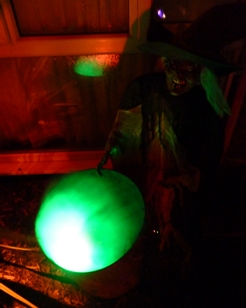 |
|
|
For 2011, I did
another one. It was very similar to the previous year, in
terms of effects, although it did have a much brighter
strobe for the lightning!
< The main addition was a witch figure that stood with a
‘cauldron’ from which green smoke billowed out. This was
done with another LED PAR 56 and a smoke machine, hidden
behind the scene, piping smoke into the base of the metal
bin.
> I also updated the skeleton shadow in the window slightly,
with the inclusion of a second light, positioned between the
cardboard silhouette and the sheet. By varying which of the
two lights flashed, sometimes the shadow appeared, and
sometimes it had vanished. Spooky! |
|
|
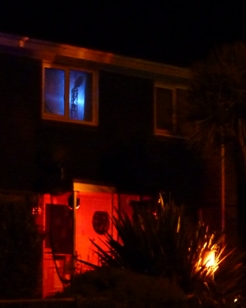 |
|
|
|
|
|
|
|
|
|
|
|
|
|
|
|
|
|
|
|
|
|
|
|
|
|
| |
 |
See the
2011 display in this short video, plus us awaiting our
first punters!
(.mp4, 30.2mb) |
|
|
|
|
|
|
|
|
|
|
|
|
|
|
|
|
|
|
|
|
|
|
|
|
|
|
|
|
|
|
|
|
|
| |
The summer of
2012 was to be when I'd leave university, and hopefully
become employed! It was time to bring this reboot of the
Halloween Experience to an end. It had been great fun
bringing it back, and I was really pleased with both of the
displays. They'd been significantly more technically complex
than the previous five, achieving automation of both sound
and lighting via motion sensors. It had been a great
opportunity to combine new lighting and control systems with
my ideas for building effects of the style I'd seen in my
favourite dark rides and walkthrough attractions!
So far, there had been seven displays, in two successful
runs. But...I wasn't done yet. The 'next generation' of the
Halloween Experience would turn out to be only another two
years away!... |
|
|
|
|
|
|
|
|
|
|
|
|
|
|
|
|
|
|
|
|
|
|
|
|
| |
 |
|
|
|
|
|
|
|
|
|
|
|
|
|
|
|
|
 |
|
|
|
|
|
|
|
|
|
|
|
|
|
|
|
|
|
|
|
|
|
|
|
|
|
|
|
|

